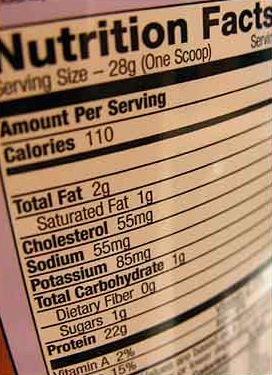From May 1, most packaged food products sold in China will have standardized, reader-friendly nutrition information labels, according to non-binding guidelines released on Tuesday by the Ministry of Health.
The guidelines, the first of their kind in the country, strongly urge manufacturers to use labels that inform consumers of the nutritional value of their products.
It marks a broadening of the government's focus on food safety to include nutritional value, Yang Yuexin, a nutrition expert with the center for disease control and prevention, said.
"Remember the 2004 fake milk powder case that killed dozens of babies in Anhui province? The powder contained few nutrients and starved babies to death," he said.
Food choice is key to life and health. The guidance will help consumers adopt a healthy lifestyle when buying packaged food, Yang said.
A recent survey in Beijing showed that 49 percent of packaged food carried some kind of nutrition label.
"The guidelines aim to standardize labeling and provide customers with information that is easy to understand," Yang said.
The new guidelines ask for labels to carry a nutritional fact chart and details of how "healthy" each product is considered to be.
Specifically, the per unit content of energy, fat, protein and carbohydrate should be stated, along with details of the saturated fat, cholesterol, sugar, vitamin and mineral content.
"Products that are labeled as being rich in fat and cholesterol are likely to drive away health-conscious buyers," Yang said.
"In that way and over time, manufacturers would be forced to discontinue the product."
The guidelines say manufacturers should ensure all the health claims they make on food labels are factual.
In the past, some manufacturers have been accused of overstating the nutritional value of their products in order to boost sales.
Zhang Lingping, a divisional director of the Ministry of Health's bureau of health supervision, urged the country's food manufacturers to be open and honest.
"They must practice strict self-discipline and be responsible for the truthfulness of the nutrition information declared," he said.
"After all, cheating cannot secure long-term profits."
Words like "rich in protein and calcium", are typical claims, she said.
Wang Jin, who runs a confectionery company, said: "We will be very careful with our labeling.
"The new approach will boost sales."
But Zhu Ying, a Beijing housewife, doubts whether the non-binding guidelines will have any real effect.
"How can you fully trust the credibility and honesty of companies without government constraints," she said.
(China Daily January 25, 2008)


